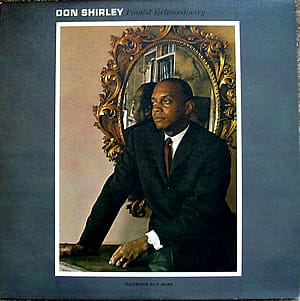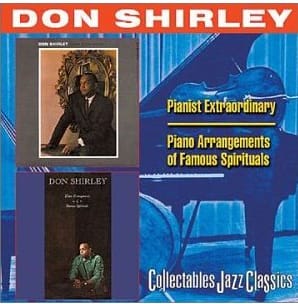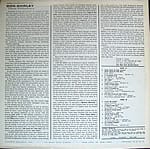
TECHNICAL
INFORMATION
This album was recorded on July 18, 1960 at the Fine
Recording Studio in New York City, employing four
Neumann U-47 microphones. Recording engineer: George
Piros. The disc masters were cut directly from the
master tapes on a Neumann lathe, employing the SX45
cutter head. (frequency response flat within 2DB
from 30 cycles to 15,000 cycles).
DESIGNER -
PHOTOGRAPHER - FRANK GAUNA
|
SIDE A
1. HOW DEEP IS THE OCEAN (How High Is The Sky)
Irving Berlin, Irving Berlin Music Corp., ASCAP 3:34
2. I UNDERSTAND
K. Gannon - M. Wayne, Leo Feist, Inc., ASCAP 2:58
3. MY SHIP
K. Weill - I. Gershwin, Chappell & Co., Inc. ASCAP 3:19
4. TIME AFTER TIME
J. Styne - S. Cahn, Sands Music Corp., ASCAP 3:51
5. LOVE WALKED IN
G. Gershwin - I. Gershwin, Gershwin Pub!. Corp., - Chappell & Co., Inc. ASCAP
4:23
6. IT'S THE TALK OF THE TOWN
J. Livingston - M. Symes - A. I . Neiburg, World Music, Hallmark Music ASCAP
3:47
SIDE B
1. LADY BE GOOD
George Gershwin, Harms Inc., ASCAP 3:25
2. I CRIED FOR YOU
G. Arnheim - A. Lyman - A. Freed, Miller Music Corp., ASCAP 4:37
3. RUSSIAN FOLK SONG
Traditional, Walbridge Co., BMI 2:06
4. MACK THE KNIFE
M. Blitzstein - K. Weill, Harms Inc ., ASCAP 3:08
5. TRUST IN ME
N. Wever - M. Ager - 1. Schwartz, Advanced Music Corp., ASCAP 2:58
6. IN OTHER WORDS
Bart Howard, Almanac Music Inc., ASCAP 2:48
Reissued on
Collectable Jazz Classics
COL2759

|
|
 Surprised
to hear just a piano? It's unusual, all right. But
then Donald Shirley's an unusual pianist. So maybe
this shouldn't come as so much of a surprise after
all. Usually today's popular pianists, especially
those who are concerned with jazz and the beat, like
to play with a bass and either guitar or drums, and
sometimes even with a big orchestra behind them. Not
Donald Shirley. " I love playing by myself," he
stated recently during an interview in his spacious
studio-apartment atop Carnegie Hall, "because it
gives me more freedom than I can get playing with a
trio or an orchestra. I work mostly with a trio, you
know, and when I do, I find myself acting as a,
conductor as well as a soloist. On this record you
might say I'm conducting only my own faculties." Surprised
to hear just a piano? It's unusual, all right. But
then Donald Shirley's an unusual pianist. So maybe
this shouldn't come as so much of a surprise after
all. Usually today's popular pianists, especially
those who are concerned with jazz and the beat, like
to play with a bass and either guitar or drums, and
sometimes even with a big orchestra behind them. Not
Donald Shirley. " I love playing by myself," he
stated recently during an interview in his spacious
studio-apartment atop Carnegie Hall, "because it
gives me more freedom than I can get playing with a
trio or an orchestra. I work mostly with a trio, you
know, and when I do, I find myself acting as a,
conductor as well as a soloist. On this record you
might say I'm conducting only my own faculties."
Keen faculties they are, too, as
anyone who has heard Donald Shirley play must
realize full well. Faculties that are constantly
probing, learning, listening, absorbing, creating,
adapting. Donald (he prefers the name to "Don")
feels that the tunes on this record adapt themselves
especially well to solo playing. " I think it would
have been superfluous to use anything else. When I
play with my trio, we try to make our three
instruments (piano, bass viol and cello) sound like
one. I'm still basically an organist at heart, I
guess. But for these selections, the piano seems
more suitable by itself."
Donald employs the technique of
transcriptions rather than that of arrangements. The
difference? "An arrangement," he points out,
"consists of rearranging notes to serve a purpose. A
transcription on the other hand is essentially
are-composition."
Almost everything Shirley plays he
writes out ahead of time. This, of course, is the
antithesis of how a jazz pianist operates. "I'm not
a jazz musician," Donald says. "But I love to listen
to some of them play." On the other hand, he does
not envy the jazz musician's life. Most jazz
artists, according to him, must accept their lot
because of their night-club environment and the
consequent emphasis on the dollar. Thus, he feels,
most people in jazz must become entertainers. "Their
first interest has to be pleasing other people. But
the chief aim of the artist is to comply with the
rules, regulations, order and protocol that concern
his art and his craft. At that point, pleasing the
public, per se becomes secondary. But, Shirley is
quick to add, "this doesn't mean I'm saying one way
is better than the other."
"And there's this to remember, too.
The concert stage is often far too formal and
stuffy. Intelligent music can still be entertaining
and humorous." Certainly both of these elements, as
well as Shirley's more serious side, including his
vast knowledge of many forms of music, come through
on the selections he has chosen for special
treatment on this record. Take the opening HOW DEEP
IS THE OCEAN, heretofore a fairly simple, romantic
melody by Irving Berlin. Donald treats it like a
Mozzorabic Chant - "an early Eastern form which led
to the Gregorian Chant. I've used a chorale form
with four part harmony. It's also in a two part song
form. The original melody is one part and the
introduction becomes the meat of the second part.
I've tried to emphasize the much part of the lyric,
how much do I love you? with the second part
attempting to answer how much."
I UNDERSTAND, the ballad which Bob
Eberly used to sing so well with Jimmy Dorsey's
band, is treated as "an impromptu, after the fashion
of the word 'impromptu' of Schubert as opposed to
Chopin. It's strictly a song concept whose melodic
lines remain its strongest element. After hearing it
again, I realize I included quite a bit of the G
FLAT MAJOR IMPROMPTU by Schubert, though I swear I
wasn't thinking about it when I wrote this
transcription."
MY SHIP, Kurt Weill 's lovely melody
from Lady In The Dark, never was treated as
orientally as Donald does here. He became especially
conscious of the song at a time when he was trying
to help Miyoshi Umeki find some material. "The tune
had always suggested an Eastern flavor to me - maybe
because of the use of the word silk. Here I
use a three part song form - first theme A, then B,
then A again, then B again, then C and then back to
A followed by B. You can hear the theme of the
introduction running all through the song."
TIME AFTER TI ME is treated "fairly
straight. If there's any improvisation on this
record, it's in this tune. I once heard a singer - I
think her name was Norma Pettiway - do it in
Washington, D. C. long before I ever got into this
business. She was a mature person - a little like
Billie Holiday - and I had the feeling she knew
'what she was talking about." No frills - just
emotion.
LOVE WALKED IN, one of George
Gershwin's last songs, is treated a la "chanson de
jeste. This is similar to a two part form , except
that here the second part is basically the original
melody played backwards. This technique is also
known as crab counter point, and it's a lot of fun
to do."
About IT'S THE TALK OF THE TOWN,
Shirley has little to explain. "It's a tune I've
always liked, and I just played it, that's all.
LADY BE GOOD, one of Gershwin's
earlier melodies ("I love Gershwin. He lends himself
so well to the piano.") is treated in a binary form.
"This is different from the two part song form ,"
Donald explains. "There is no distinct second
grouping. Instead there's just a fragmentary
development of the bridge (the song's 17th through
its 24th bars). I've fused Eastern and Western
harmonies here too."
I CRIED FOR YOU reflects Shirley's
reactions to the song's lyrics. The form is ternary.
"The words are filled with what you might call
antagonistic reciprocation, a kind of
I'll-get-even-with-you feeling. But there is also
some implied optimism, too, like
maybe-we'll-get-together-after-all. The first two
forms are developed in minor and then suddenly I
burst into major, which is the optimistic portion.
At the end the left hand plays in major, sort of a
triumph for the time being. But it couldn't remain
in major because
of the strict form of the ternary which called for
going back to the first theme in minor. This is all
done on a series of diatonic scale patterns."
The treatment of RUSSIAN LULLABY is
"more nostalgic than anything else. Its basically a
Moment Musicale, a short piece that has no other
purpose than of being lived for that particular
moment. It's played more for oneself than for any
audience."
MACK THE KNIFE, another Kurt Weill
number has, according to Shirley, "never been
recorded with any proper feeling for the tune.
Originally in Three Penny Opera it was used as a way
of telling the people of England what the
politicians were doing. But whenever any officials
went by, instead of singing those Voice of the
People words, they'd switch to lyrics that made no
sense. It was Weill 's way of poking fun at the
politicians of England. Later the song was switched
to poke fun at Hitler, and Weill, who had nothing to
do with the switch but who was a German, was in
danger of being killed for this. My treatment is
also filled with a great deal of bitterness. I
worked on the transcription while I was listening to
the Democratic National Convention, and all the
vulgarity there made me mad. You can sense the
bitterness, the way I even quote from THE STAR
SPANGLED BANNER and I'VE BEEN WORKING ON THE
RAILROAD. So much is promised, but so much less is
given." Shirley has very strong feelings about
politics and, of course, about the racial situation,
and he contends that an artist has not only the
right but also the obligation to express himself on
subjects such as these through his art.
TRUST IN ME has less serious
overtones. "It's just improvisation. The song always
reminds me of Kate Smith - I love her! I love her! -
and I guess I was influenced by her note of
sincerity, her straightforwardness, her honesty, her
always seeming so happy, like the real, All-American
Girl."
IN OTHER WORDS, known to some as FLY
ME TO THE MOON, is to Donald "a real, thought-out
American song. Bart Howard wrote it and there
are only a handful of people like him. Alec Wilder
is one and so is Harold Arlen on occasion. The
treatment here becomes an etude, a study in tonal
contrasts, and it's the most ambitious of all the
twelve works on this record. If you listen closely,
you can hear a low G sharp being held through the
first portion."
Actually, all the numbers on this
record bear much close listening. On first hearing,
some may seem strangely simple. But the more one
listens closely, the more there is to hear. It is
the sort of piano playing very few people can do -
and even fewer can do as well as Donald Shirley does
right here.
- George T. Simon
Author of THE FEELING OF JAZZ
and jazz commentator of The New York Herald-Tribune |

